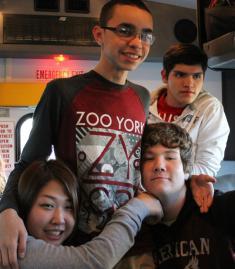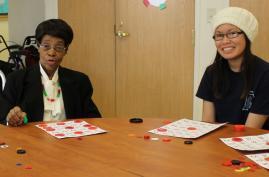Civil Rights J-Term
Urban immersion puts face on civil rights
 Sitting in a Chicago neighborhood restaurant, junior Carole Evans and several other students in Bethany’s Civil Rights J-Term watched a news report of yet another act of violence—not in Chicago, but a random shooting at a grocery store back home in Elkhart County.
Sitting in a Chicago neighborhood restaurant, junior Carole Evans and several other students in Bethany’s Civil Rights J-Term watched a news report of yet another act of violence—not in Chicago, but a random shooting at a grocery store back home in Elkhart County.
The news reinforced what she and her classmates had been learning—violence isn’t just an issue in poor neighborhoods of big cities. She says, “It is good to go to Chicago to learn, and to help those in need, but we can make a difference back home too.”
 In addition to realizing anew that violence isn’t just a big-city issue, students also became more aware that they can be safe in places often perceived as dangerous, such as poor urban neighborhoods. When Bethany students first arrived in Chicago, the director of the Chicago DOOR program told them, “you will be uncomfortable, but you will also be safe.” And they were uncomfortable—and troubled—as they saw a different side of Chicago from the wealth of the downtown shopping and tourist district they previously knew: dilapidated houses, disparity among racially-segregated neighborhoods, and larger numbers of people living on the street or in shelters.
In addition to realizing anew that violence isn’t just a big-city issue, students also became more aware that they can be safe in places often perceived as dangerous, such as poor urban neighborhoods. When Bethany students first arrived in Chicago, the director of the Chicago DOOR program told them, “you will be uncomfortable, but you will also be safe.” And they were uncomfortable—and troubled—as they saw a different side of Chicago from the wealth of the downtown shopping and tourist district they previously knew: dilapidated houses, disparity among racially-segregated neighborhoods, and larger numbers of people living on the street or in shelters.
Sophomore Ryan Oostland notes, “When we drive the Skyway to downtown Chicago, we pass over and see from a distance those neighborhoods where ‘we don’t go.’ This time we went.”
 A highlight for junior Kati Quiggle was interacting with people as the students served in soup kitchens, shelters, thrift shops, nursing homes, and after-school programs. She found these opportunities enlightening and rewarding and says, “People I met were different in that everyone has their own story, with different experiences than I, yet they are quite normal. They are like me.”
A highlight for junior Kati Quiggle was interacting with people as the students served in soup kitchens, shelters, thrift shops, nursing homes, and after-school programs. She found these opportunities enlightening and rewarding and says, “People I met were different in that everyone has their own story, with different experiences than I, yet they are quite normal. They are like me.”
Another highlight for many students was listening to stories from a Baptist pastor whom they affectionately called Mama Brenda. As she shared stories from her work in counseling teens, students saw a different side of some issues they also face. For ninth-grader Daniel Robles, Mama Brenda’s stories of working with children who have been bullied brought back painful memories of his own experiences during elementary school—of being bullied to the point of not wanting to live any more—and he is thankful that he no longer experiences that.
Prior to their week in Chicago, students studied civil rights history and current issues, including slavery and its lasting effects on American society, the Civil Rights movement, and more recent events such as the fatal shooting of Trayvon Martin two years ago. Eric Kaufmann, who developed and taught the course says, “Helping students understand the past is important as they grapple with present-day civil rights issues that are rooted in injustices from the past. And it is gratifying to see students connect their faith to the issues at hand.”